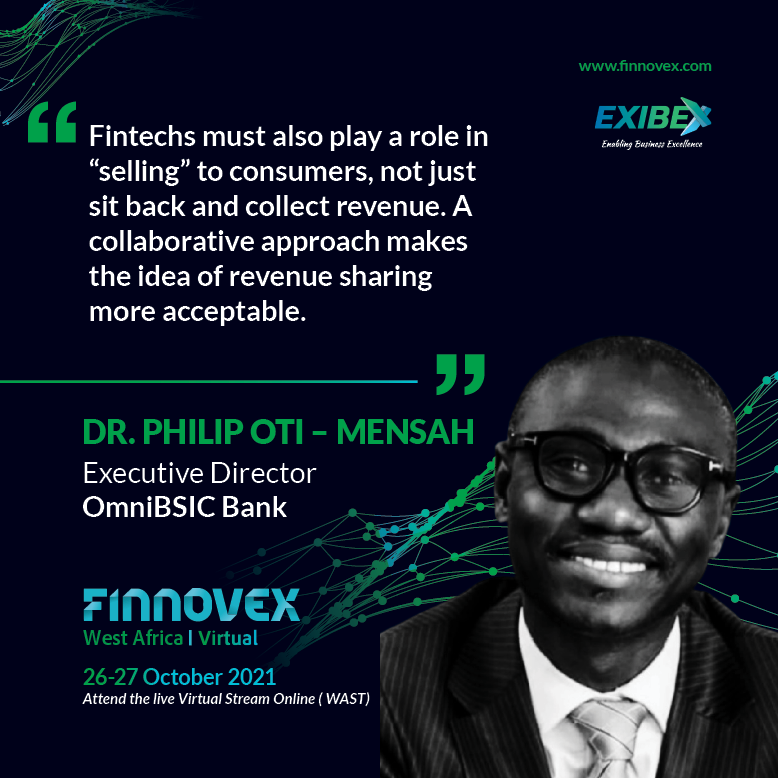Speaker Interview- Dr. Philip Oti – Mensah
HOME / Speaker Interview- Dr. Philip Oti – Mensah

Dr. Philip Oti-Mensah is currently the Executive Director at OmniBSIC Bank. He is a Certified International Change Manager and member of IABFM. His work and performance over the last 17 years has won him many coveted awards.
Dr. Oti-Mensah will be speaking live at Finnovex West Africa Summit.
Please have a look at his view on our upcoming Leading Summit on Financial Services Innovation and Excellence held from 26th – 27th October 2021.
Q-The “New Normal” has led to the adoption of the technological way of life, how can new technology be instilled among staff members?
Good Question. This is about innovation adoption.
Technology adoption by the target market has had mixed outcomes. New technologies/products are introduced with high expectations but actual adoption and use by the target group is generally low. For example, the internet penetration rate in Ghana is almost 40% but bank clients actually using internet banking is less than 2% though the product was introduced more than 20 years ago in Ghana.
On the other hand, mobile money which was introduced just about 11 years ago has a penetration rate of over 60%. The solution lies in staff (especially sales force) adoption. Safaricom and MTN recognized the three levels of adoption (company, sales force, client adoption) and used it to achieve massive penetration. To the question itself. Staff adoption can be achieved in the following ways:
1. Proper change management: There must be a conscious effort by the companies to achieve mindset change among staff.
2. Internal Piloting and company readiness
3. Regular Training
4. Supervisor support
5. Management posture and support
Q-Can you highlight some evolving legal and regulatory context guiding the West African Fintech Space?
1. Promotion and ownership of fintechs: Should fintechs be owned by Banks/Telcos or should regulation insist that they are separate entities?
2. Electronic Money Issuance: Should Banks be allowed to run EMI as departments or should regulation insist that they should be separate entities?
3. Pricing: To what extent should regulation drive the pricing of mobile financial services? To achieve maximum financial inclusion, both affordability from the view point of customers and profitability from the view point of service providers are all important.
4. Given that cross border transactions have always been heavily regulated with strict KYC and controls (SWIFT, Cards), to what extent should such regulation be transferred into the ongoing mobile financials services revolution and AfCFTA? Should controls be lowered to accommodate African integration?
Q-Are there any systematic principles Fintechs can implement in understanding and reaching the unbanked in the West Africa region?
History and culture of a country must be thoroughly researched and understood before product concept development. The strategic management process must also be applied (analysis, formulation, implementation, monitoring and control).
The Unique Selling Proposition (USP) of a “new” product but be unambiguous. Cost is therefore important for the unbanked. Fintechs should not charge prohibitive prices to exclude the very people they want to include. Every product must be easy to understand and use (user friendliness). Innovation adoption principles must be thoroughly applied. Answer:
Q-As strong advocates of fostering partnerships and collaborations between Fintechs and Banking Financial Institutions, how can collaborations be fostered?
Firstly, in going back to the basics the concepts of division of labor and specialization must be understood by the players. There should also be a willingness to share revenue.
Fintechs must also play a role in “selling” to consumers not just sit back and collect revenue. A collaborative approach makes the idea of revenue sharing more acceptable.
Finally, advocacy for Fintechs being the “new” players should in support of collaboration. Banks should also be open minded and understand the ongoing revolution requires collaboration.
Q-Can you identify 5 trends that are likely to shape the future of Fintech within the West African landscape?
1. Internet penetration
2. The price of data
3. USSD penetration
4. Collaboration with Banks, Merchants, Insurance Companies, etc
5. Access to funding
6. Research and Development
Q-. In comparison to industry standards, how is your organization measuring its current competency levels?
1. Setting SMART goals and objectives and measuring output/performance regularly
2. Regular training need analysis and training
Q-. What methods can BFSI Leaders leverage in reaching the unbanked within the West African region effectively?
The current client portfolios should be seen and deployed as a marketing resource
Cross selling opportunities
Organizational adoption as a prerequisite to customer adoption
Q-.What aspects of the Summit should industry peers be on the lookout for as they gear up for the Summit?
Different perspectives from different countries
Insights based on extensive research and practical experience
Ideas and solutions to enable young leaders succeed